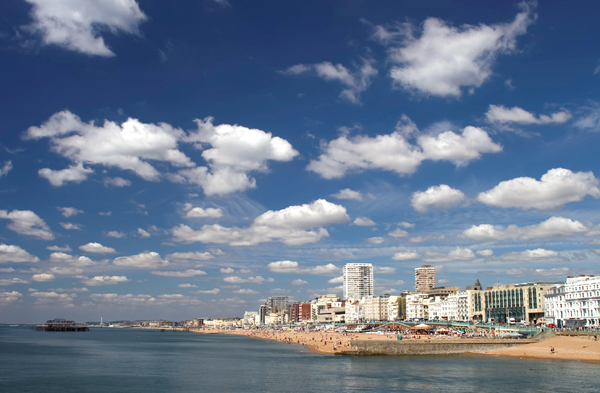The Brighton and Hove divorce debate
The idea of a Greater Brighton looks like gaining ground even as some ask whether Brighton and Hove should be split asunder. Frank le Duc reports

Businessmen and women from across the area will be debating whether Brighton and Hove should divorce at a meeting on Tuesday 26 February.
Some believe that Hove has been swallowed up by its bigger neighbour, especially since the merger of the old local authorities into what is now Brighton & Hove City Council. The complaints echo those made by some people in Portslade after it officially became part of Hove in the 1970s.
Others want Brighton to go it alone. Brighton is the brand, they say, and Hove is an adjunct. Few people from outside Sussex talk about Brighton and Hove except in the most formal sense. They talk about Brighton even when they mean somewhere near by.
And plenty of locals, when asked where they are from, repeat the old refrain: “Brighton. Well, Hove actually.” And a few even add: “Portslade unfortunately.”
A similar debate on a bigger stage is taking place north of the border – no, not in Mid Sussex, but in Scotland. The question of independence revolves around many of the same issues. Are we better off together or apart? The practical choices are starker for the Scots. They include which currency to use – the pound or the euro? And how to defend the country, although much of the British Army often seems to be Scottish.
Julia Chanteray, president of Brighton and Hove Chamber of Commerce, the organiser of Tuesday’s debate, said: “It might seem whimsical to talk now about a split between Brighton and Hove but it isn’t that long since you could say the same of England and Scotland. Yet look what’s happening there. The Chamber’s ‘Big Debate’ about our city is being held in the light of the Scottish debate about national independence.”
In Brighton and Hove the question is being debated just as the government has expressed interest in striking a deal with a Greater Brighton. This bigger entity would include Lewes and Newhaven, Shoreham, Lancing and Worthing. In the eyes of ministers it has critical mass – a population of 500,000 rather than 273,000.
It also has two ports and an airport as well as being close to Gatwick. And, as a city region, it offers the prospect of jobs and business growth at a time when the economy seems to have stalled for an uncomfortably long time. Brighton as a shorthand description of our coastal conurbation is better able to compete with cities such as Bristol, Birmingham and – looking abroad – the likes of Barcelona.
Andrew Nichols, from the Hove Business Association, is one of the debate’s panellists. He said: “With the current financial constraints all local authorities are having to work with, splitting Brighton and Hove back to independence would not be a good way forward even if it was financially viable. While I’m sure the marketing of the city will always be Brighton-focused, Hove has continued to develop its own offer and brand and I think we should grasp the opportunities to further enhance and appreciate the benefits that Hove has to offer for both businesses and residents.”
His comments reflect the pragmatism in the closing scenes of the popular Ealing comedy Passport To Pimlico – and the locally flavoured production premiered at the Brighton Festival last year, Hanover – The Musical. Ideas of independence are tempered by the mutual benefits of co-operation. Differences are set aside and everyone pulls together. And that’s the lead that local politicians – from different parties – are trying to give with the idea of a Greater Brighton.
“It’ll be fascinating to find out who gets to the keep the Fatboy Slim CDs”
Jason Kitcat, the leader of Brighton and Hove City Council, wants the Greater Brighton proposal to play
on the strengths of the wider area.
These include Brighton’s position as a significant player in the digital and creative industries. And perhaps not surprisingly, given his background in the Green Party, he is keen to promote the growing opportunities presented by environmentally friendly technologies – the city as an “eco-tech hub”.
The Greater Brighton area is earning recognition on this front, not just in government circles. It is partly why the area is included in the government’s “City Deal” programme. Civic and business leaders have less than six months to make their case to ministers and civil servants for more power to make decisions locally. These include some big spending decisions.
Councillor Kitcat said: “This is a major step forward, giving us the opportunity to make a big difference to the city and the region. We are rightly very ambitious and I am delighted the city region’s importance to the national economy has been recognised. This status complements the super connected city work which is already under way after our bid for ultrafast broadband last year. We will continue to work hard with our partners to secure a deal which will strengthen our economy and nurture local business.”
One official said that the idea of a divorce for Brighton and Hove just as the Greater Brighton proposal promised so many benefits was to go “from the sublime to the ridiculous”. He said that the two towns had more in common than they had differences setting them apart. And the same was true of the council’s neighbours – Lewes District Council, Adur District Council and Worthing Borough Council.
The Greater Brighton brand would give many more people the chance to compete in a fast-changing world. He cited American Express with new offices in Brighton bringing more jobs to the area. And he said that the “functioning economic area” would never neatly match council boundaries. So when the power company Eon chose Newhaven as the home of maintenance crews for its proposed wind farm in Newhaven, rivalries were set aside. The relaxed view was that in reality the people working there were as likely to live in somewhere like Brighton or Hove or spend their money here.
The economic pull seems to be in the direction of Brighton becoming the umbrella name for not just Hove but for the wider area. Sentiment and a sense of place and history may tug in the other direction. Some businessmen and women in Hove may believe that independence and niche marketing would help their cause. Chamber of Commerce president Julia Chanteray said: “Whether it’s Brighton or Hove that would be gaining their independence remains to be seen. And it’ll be fascinating to find out who gets to the keep the Fatboy Slim CDs.”
* The Chamber of Comerce Big Debate takes place from 6pm to 8pm on Tuesday 26 February at City College in Pelham Street, Brighton. Not Hove. Entry is free and all businesses are welcome, including those who are not Chamber members. Seating is limited. For tickets go the Chamber website www.businessinbrighton.org.uk
Opinion: Phil Graves
Managing director of estate agent Graves Jenkins… and
a Brightonian
“Think clear and think straight – the locations of Brighton and Hove are stronger together than apart. One of and if not the major attraction of the city is the diversity.
“Whether it’s the London-by-the-Sea tag, a great place to do business, the picture postcard weekend away, the Pride procession, the football and cricket clubs, Brighton Pier, Hove Lawns or the Royal Pavilion –
the entire offer is unique and it’s what makes us strong through a recession and even stronger during better economic times.
“And think of the people as opposed to the events and attractions – the Hovites, the Brighton greens, the city professionals, the antique dealers, the students, the ones that work in and the ones that work out of the city, but all reside in the best place in the UK.
“Surely this is why we have a problem in trying to find sufficient housing and workspace for everyone who wants a slice of the city of Brighton AND Hove. Change the name to Synergy City – the working together of two parts to produce a result greater than their individual effects.”




















